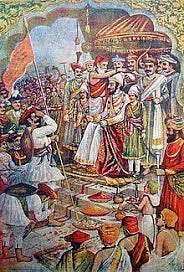Coronation Day: Chhatrapati Shivaji Maharaj
This article discusses the significance of Shivaji Maharaj's coronation and its impact on Indian history.
The coronation of Shivaji Maharaj was a momentous occasion in Indian history. It marked the beginning of the Maratha Empire, which would eventually become one of the most powerful empires in India.

From a young age, he began his military career, leading a series of successful campaigns against the Bijapur Sultanate and the Mughal Empire. He also established several forts, including the famous Raigad Fort, which would become the capital of the Maratha Empire.
In 1674, Shivaji Maharaj was crowned king of the Maratha Empire in a grand ceremony at Raigad Fort. Thousands of people attended the lavish event, where Shivaji Maharaj was crowned with a golden crown and given the title of Chhatrapati, meaning "Emperor."
The Maratha Empire would eventually become one of the most powerful empires in India and played a significant role in the fight for independence from British rule.
The coronation was a major turning point in Indian history, marking the beginning of a new era of Hindu rule. The Maratha Empire would eventually become one of the most powerful empires in India and played a significant role in the fight for independence from British rule.
Today, the coronation day is celebrated as a significant event in Indian history. It serves as a reminder of the strength and resilience of the Hindu people and is a source of inspiration for those fighting for freedom and justice.
The coronation is significant for several reasons:
It marked the beginning of the Maratha Empire, which would eventually become one of the most powerful empires in India.
It was a major turning point in Indian history, ushering in a new era of Hindu rule.
The Maratha Empire played a significant role in the fight for independence from British rule.
It is an inspiration to those who continue to fight for freedom and justice.



